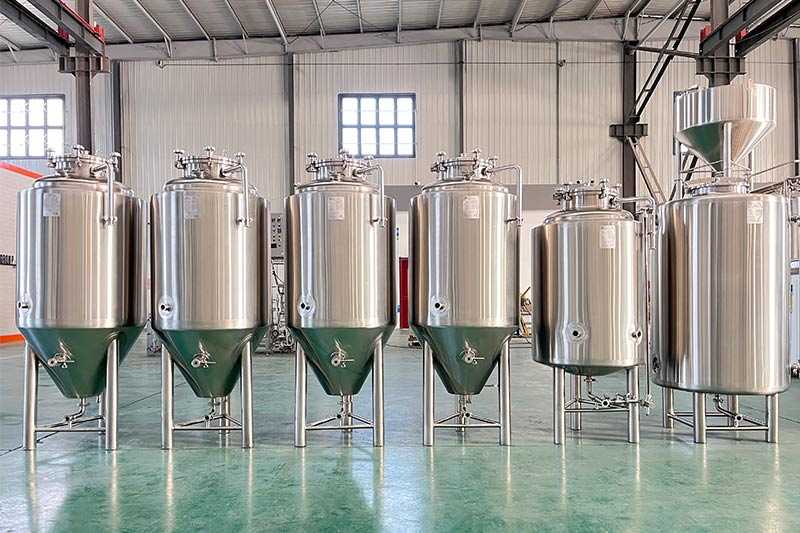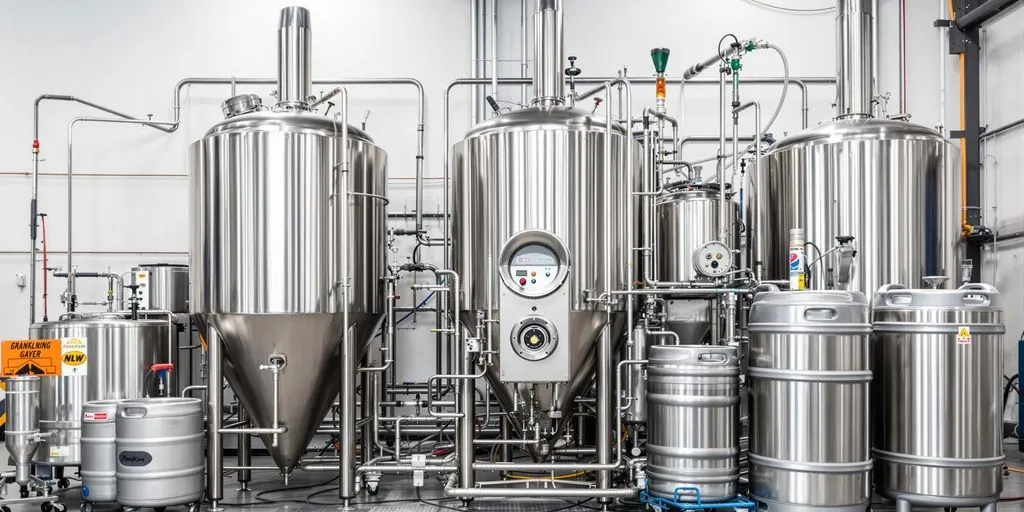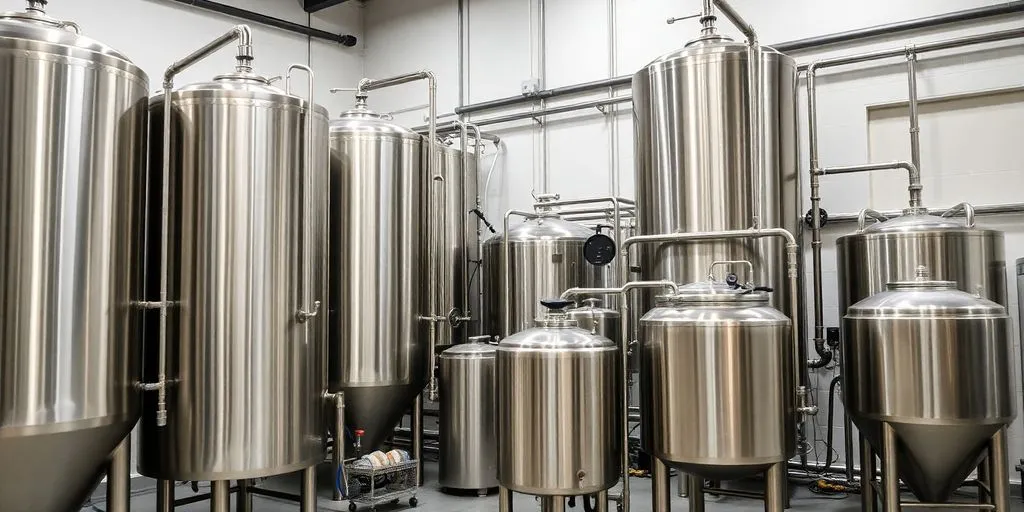Discover how new beer brewing equipment is transforming the way we brew beer at home and in microbreweries. This comprehensive guide delves into the latest brewing equipment kits, offering insights into choosing the right gear, understanding the brewing process, and enhancing your brewing experience. Whether you’re a novice or an experienced brewer, this article is packed with valuable information to elevate your craft.

Table of Contents
What Makes a Great Beer Brewing Kit?
A beer brewing kit is the foundation for any aspiring brewer. But what exactly makes a kit great?
- Comprehensive Equipment: A good kit includes essential items like a kettle, fermenter, wort chiller, and grain mill.
- Quality Materials: Equipment made from stainless steel is durable and easy to clean.
- Ease of Use: Kits designed for home brew should cater to beginners and experts alike.
Investing in a high-quality brewing kit sets you up for success and makes the brewing process enjoyable.
Recommended Kits:
- Beer Brewing Equipment: Offers a wide selection of professional-grade equipment suitable for all levels.
How to Choose the Right Brewing Equipment for Your Needs
Selecting the right brewing equipment can be overwhelming. Here’s how to make the best choice:
- Determine Your Batch Size: Are you brewing one gallon or planning larger batches?
- Consider Your Space: Ensure you have enough room for the equipment, especially for items like the kettle and fermenter.
- Set a Budget: High-quality equipment is an investment. Prioritize according to your brewing goals.
- Check Material Quality: Opt for stainless steel for durability and sanitation.
By assessing your needs, you can choose equipment that enhances your brewing experience.
Explore More:
- Nano Brewery Equipment: Ideal for small-scale brewers looking to upgrade.
Why Grain Mills are Essential in Brewing Beer
A grain mill is a crucial tool for brewers who prefer all-grain brewing.
- Freshness Matters: Milling grains just before brewing ensures freshness and better flavor extraction.
- Control Over Grind Size: Adjusting the grind impacts the efficiency of the mash.
- Cost-Effective: Buying grains in bulk can save money in the long run.
Incorporating a grain mill into your setup can significantly improve your beer brewing process.
Check Out:
- Commercial Brewery Equipment: For professional-grade grain mills and more.
Exploring All-in-One Brewing Systems
All-in-one brewing systems simplify the brewing process by combining multiple functions.
Benefits:
- Space-Saving: Ideal for those with limited space.
- User-Friendly: Perfect for beginners wanting to make beer without complex setups.
- Efficiency: Streamlines the brewing process, reducing the chance for errors.
Whether you’re new to brewing or looking to simplify, an all-in-one system might be the perfect fit.
Learn More:
- Beer Brewing System: Explore various systems designed for efficiency.
The Role of Temperature Control in Fermentation
Proper temperature control is vital during fermentation. Here’s why:
- Yeast Performance: Different yeast strains require specific temperatures.
- Flavor Development: Temperature affects the production of flavor compounds.
- Avoiding Off-Flavors: Incorrect temperatures can lead to undesirable tastes.
Investing in equipment with precise temperature settings ensures your beer turns out great every time.
Recommended Equipment:
- Conical Fermenters: Provides excellent temperature control and ease of use.
Stainless Steel Kettles: The Heart of Your Brewing Process
Your kettle is where the magic begins. Here’s why stainless steel kettles are a must:
- Durability: Resistant to rust and corrosion.
- Heat Distribution: Provides even heating for better wort quality.
- Easy to Clean: Simplifies the sanitation process.
A high-quality stainless steel kettle is an investment that pays off in the long run.
Suggested Product:
- 2 Vessel Brewhouse: Features top-grade kettles for efficient brewing.
Do You Need a Wort Chiller in Your Brewing Kit?
A wort chiller rapidly cools your wort after boiling, and here’s why it’s essential:
- Prevents Contamination: Faster cooling reduces the risk of bacterial growth.
- Improves Clarity: Encourages proteins to coagulate, resulting in clearer beer.
- Enhances Flavor: Rapid cooling preserves hop aromas and flavors.
Including a chiller in your brewing kit is a smart move for any serious brewer.
Learn About:
- Wort Chillers: Explore various options to suit your brewing needs.

Electric Brewing vs. Traditional Methods
Choosing between electric brewing and traditional gas methods depends on several factors.
Electric Brewing:
- Precision: Allows for precise temperature control.
- Safety: Eliminates open flames, reducing fire risks.
- Convenience: Easier to set up in indoor spaces.
Traditional Methods:
- Power: Gas burners can reach higher temperatures quickly.
- Cost: Initial setup might be cheaper.
- Authenticity: Some brewers prefer the traditional approach.
Consider your priorities to decide which method aligns with your brewing goals.
Further Reading:
- Electric Brewing Systems: Modern solutions for precise brewing.
Tips for Maintaining Sanitation in Home Brewing
Keeping your equipment clean is crucial for brewing great beer.
- Regular Cleaning: Clean kettles, fermenters, and tools after each use.
- Use Proper Sanitizers: Opt for food-grade sanitizing solutions.
- Avoid Contamination: Keep equipment covered when not in use.
Remember, good sanitation practices can make or break your home brew.
Sanitation Essentials:
- Sanitation Equipment: Find everything you need to keep your brewery spotless.
Getting Started: Brewing Beer at Home
Starting to brew beer at home is an exciting journey. Here’s what you need:
- Starter Kits: Includes basic equipment like a fermenter, bucket, and bottle caps.
- Ingredients: Grain, hops, yeast, and water.
- Patience: Good beer takes time to ferment and mature.
By starting with a simple home brewing equipment setup, you can gradually expand as you gain experience.
Starter Kits:
- Beer Brewing Kit: Perfect for beginners ready to dive into brewing.
FAQs About Beer Brewing Equipment
Starter kits can range from $100 to $300, depending on the quality and inclusions.
Yes, all-grain brewing requires additional equipment like a mash tun and grain mill.
For small batches, a kitchen stove may suffice, but a dedicated burner is better for larger volumes.
Conical fermenters allow for easy separation of yeast and sediment, improving beer clarity.
It’s crucial. Precise temperature control ensures proper fermentation and flavor development.
Conclusion
Brewing your own beer is a rewarding hobby that combines art and science. With the right brewing equipment, you can craft delicious home brew that rivals commercial options. Remember to focus on:
- Choosing quality beer brewing equipment suited to your needs.
- Understanding the importance of each component, from kettles to fermenters.
- Maintaining proper sanitation throughout the process.
Ready to embark on your brewing journey? Contact us to explore our wide selection of top-notch brewing equipment and take the first step towards creating your perfect pint.
Key Takeaways
- Invest in a comprehensive beer brewing kit to ensure you have all necessary tools.
- Grain mills and wort chillers enhance the quality of your brew.
- Temperature control is vital during fermentation for optimal flavor.
- Choose between electric brewing and traditional methods based on your needs.
- Proper sanitation cannot be overstated in brewing.
For more information on brewing equipment and supplies, check out these resources:
- Beer Brewing Equipment: Explore our range of equipment.
- Microbrewery Equipment: Ideal for small-scale commercial brewing.
- Conical Fermenters: Upgrade your fermentation process.
- Cider Brewing Equipment: Venture into cider making.
- Bright Tanks: For storing and conditioning your beer.
Cheers to your brewing success!
Invest in quality equipment, embrace the art of brewing, and enjoy the fruits of your labor.

